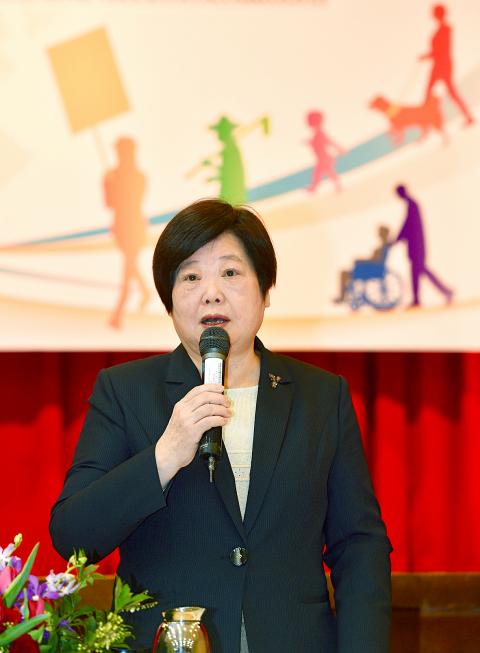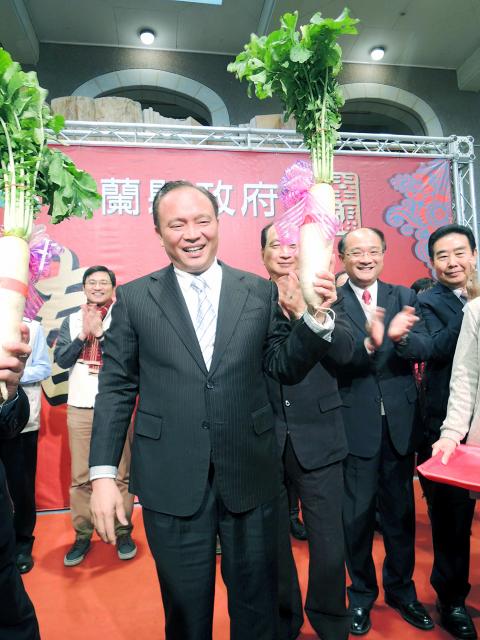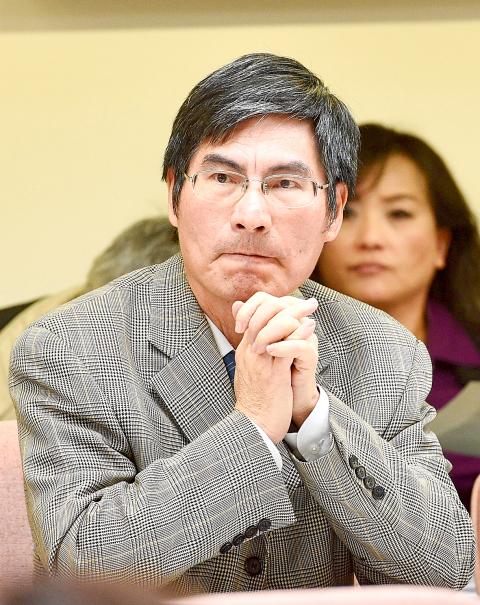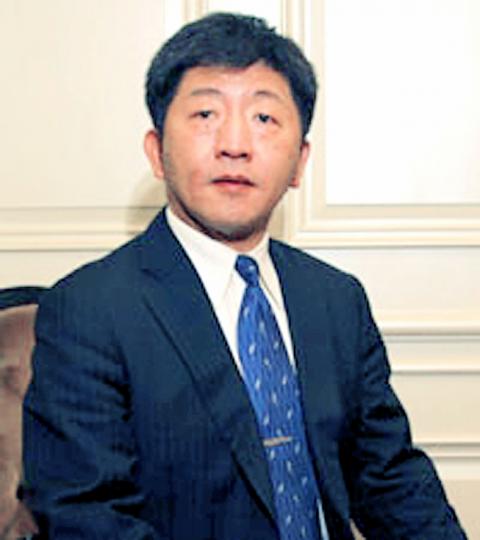The Executive Yuan yesterday announced a Cabinet reshuffle, appointing four ministers and confirming rumors circulating ahead of the Lunar New Year holiday that the government was considering a reshuffle to improve policy implementation.
Deputy Minister of Education Chen Liang-gee (陳良基) has been appointed minister of science and technology; former deputy minister of health Chen Shih-chung (陳時中) has been tapped to head the Ministry of Health and Welfare; Yilan County Commissioner Lin Tsung-hsien (林聰賢) has been appointed council of agriculture minister; and Minister Without Portfolio Lin Mei-chu (林美珠), who is also President Tsai Ing-wen’s (蔡英文) cousin, has been appointed minister of labor.
Lin Mei-chu’s specialty in law will be a boon for the government following amendments to the Labor Standards Act (勞動基準法), Executive Yuan spokesperson Hsu Kuo-yung (徐國勇) said.

Photo: Peter Lo, Taipei Times
Lin Mei-chu is expected to shoulder the responsibility of communicating with the public on the controversial amendments, the Executive Yuan said, adding that she would be retaining her position as minister without portfolio.
Lin Tsung-hsien, 55, comes from a family of farmers and studied at then-National Chiayi Institute of Agriculture, now National Chiayi University, the Executive Yuan said, adding that with such a background, the government hopes Lin Tsung-hsien will be suited to promote the government’s agricultural policies.
Chen Shih-chung promised that the policy of including doctors under the Labor Standards Act would not be changed, saying that “medical services are a part of the service sector.”

Photo: Chiang Chih-hsiung, Taipei Times
He cited drafting the white paper for the Tsai administration’s medical policies as his qualifications for accepting the position.
Regarding a controversy over the government’s plan to lift a ban on food imports from five Japanese prefectures, Chen Shih-chung said Taiwan must connect with the world and should base its decisions on facts.
He rejected the notion that ministers without portfolios have greater power than ministers, saying that the former are tasked with policy instruction, while the latter focus on implementation.

Photo: Peter Lo, Taipei Times
Meanwhile, Chinese Nationalist Party (KMT) caucus deputy secretary-general Lin Wei-chou (林為洲) said the party would not comment on the appointments until it observes the new ministers.
Implementing reform is not a 100m dash and the Cabinet should focus on communication and building consensus, he said.
Taoyuan Confederation of Trade Unions chairman Mao Chen-fei (毛振飛) said he did not have high expectations for Lin Mei-chu because of her specialty in law.

Screengrab from Taipei Medical University’s Web site
Lin Mei-chu is a foreign name to the labor sector, Mao said, adding that from his experience law experts are cold and rigid.
“Law is not everything,” Mao said, citing the example of former minister of labor Jennifer Wang (王如玄), also a legal expert, who filed a lawsuit against workers protesting the closure of the factory they worked at.
Additional reporting by Cheng Hung-ta and CNA

CHAOS: Iranians took to the streets playing celebratory music after reports of Khamenei’s death on Saturday, while mourners also gathered in Tehran yesterday Iranian Supreme Leader Ayatollah Ali Khamenei was killed in a major attack on Iran launched by Israel and the US, throwing the future of the Islamic republic into doubt and raising the risk of regional instability. Iranian state television and the state-run IRNA news agency announced the 86-year-old’s death early yesterday. US President Donald Trump said it gave Iranians their “greatest chance” to “take back” their country. The announcements came after a joint US and Israeli aerial bombardment that targeted Iranian military and governmental sites. Trump said the “heavy and pinpoint bombing” would continue through the week or as long

TRUST: The KMT said it respected the US’ timing and considerations, and hoped it would continue to honor its commitments to helping Taiwan bolster its defenses and deterrence US President Donald Trump is delaying a multibillion-dollar arms sale to Taiwan to ensure his visit to Beijing is successful, a New York Times report said. The weapons sales package has stalled in the US Department of State, the report said, citing US officials it did not identify. The White House has told agencies not to push forward ahead of Trump’s meeting with Chinese President Xi Jinping (習近平), it said. The two last month held a phone call to discuss trade and geopolitical flashpoints ahead of the summit. Xi raised the Taiwan issue and urged the US to handle arms sales to

BIG SPENDERS: Foreign investors bought the most Taiwan equities since 2005, signaling confidence that an AI boom would continue to benefit chipmakers Taiwan Semiconductor Manufacturing Co’s (TSMC, 台積電) market capitalization swelled to US$2 trillion for the first time following a 4.25 percent rally in its American depositary receipts (ADR) overnight, putting the world’s biggest contract chipmaker sixth on the list of the world’s biggest companies by market capitalization, just behind Amazon.com Inc. The site CompaniesMarketcap.com ranked TSMC ahead of Saudi Aramco and Meta Platforms Inc. The Taiwanese company’s ADRs on Tuesday surged to US$385.75 on the New York Stock Exchange, as strong demand for artificial intelligence (AI) applications led to chip supply constraints and boost revenue growth to record-breaking levels. Each TSMC ADR represents

State-run CPC Corp, Taiwan (CPC, 台灣中油) yesterday said that it had confirmed on Saturday night with its liquefied natural gas (LNG) and crude oil suppliers that shipments are proceeding as scheduled and that domestic supplies remain unaffected. The CPC yesterday announced the gasoline and diesel prices will rise by NT$0.2 and NT$0.4 per liter, respectively, starting Monday, citing Middle East tensions and blizzards in the eastern United States. CPC also iterated it has been reducing the proportion of crude oil imports from the Middle East and diversifying its supply sources in the past few years in response to geopolitical risks, expanding